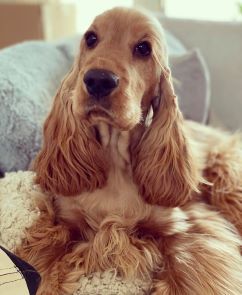|
Puppy Care
 |
|
Feeding Your Puppy Choose a dry food intended specifically for puppies, avoiding generic foods and those that sell for unusually low prices. We reccomend Advance Puppy Plus dry and wet food. Look for products that are grain free; dogs do not naturally eat wheat products. Offer food to young puppies four times a day. If your puppy isn't hungry that often, reduce the frequency. After ten or twelve weeks of age, feed three a day. Let your puppy eat as much as they want in fifteen minutes and then pick up the food dish. Having food continually available encourages overeating, and chubby puppies are more likely to have weight problems later in life. If your puppy becomes loose in their poo resort to cooked chicken and rice. Immunisation Between six and sixteen weeks of age, puppies lose the disease protection they received from their mothers and become able to form their own immunity to disease. Unfortunately, we never know when this will happen, so there is often a brief period when puppies have lost the disease protection they received from their mothers but have not yet developed strong immunity of their own. Fortunately, new vaccines for distemper and parvovirus are much more effective than what we had even two or three years ago, and eliminate much of this problem. Vaccination should occur at 6, 12 and 18 weeks, then at 12 months of age and every three years after. House Training Puppies have a strong natural instinct to avoid soiling their own area. If you are consistent and patient, this natural urge for cleanliness makes house training fairly easy. You can begin training soon as they arrive in your home. Teaching where to go. When you first bring your puppy home, show them where you want them to toilet. I usually recommend walking around the back yard with the puppy, saying "Go Toilet'. This is not play time. When it happens, make a big fuss and praise. I suggest that you take the puppy out every 20 minutes throughout the day and go through the same routine each time. Also after eating and drinking. When you find the right schedule, the result is a dog that eats and then has a bowel movement within a few minutes. Feed indoors. Remember, dogs do not like to eliminate where they eat. Take your puppy outside: · after waking up, even from a nap, · after extreme excitement, · after drinking water · after prolonged chewing on a toy, etc. · if he starts sniffing around the house for a good spot Destructive Chewing It is natural for puppies to chew; that's one of the ways they explore and learn. Try to keep valuable objects that are chewable safely out of reach and provide a satisfactory alternative by providing a nylabone chew toys, or Kong toys which dispense food or lick mats. Destructive chewing is merely a way to work off excitement and relieve frustration, not an insidious plan to get even with you. If you choose toys consider strong rubber ones or children's toys available from Salvos.
|
![]()
![]()
![]()
![]()
![]()
|
![]()
|
|
|
|